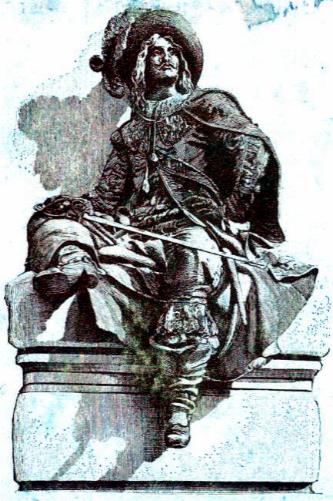
We now come to that time when the adventure of The Three Musketeers is resolved, and D'Artagnan achieves his life-long goal: to become a musketeer.
D'Artagnan finally meets the Man of Meung who takes him to the Cardinal. Upon having an interview with the Cardinal, D'Artagnan is told that he is under arrest on the accusation that he has been corresponding with enemies of the kingdom, and for having tried to defeat the plans of his General. D'Artagnan asks who imputes these crimes on him, and not surprisingly it is Milady. D'Artagnan then explains of Milady's ill-doings, and of her death. While D'Artagnan attempts to justify Milady's death, (as he and his companions were the ones who murdered her)the Cardinal points out that the friends would clearly have a bias towards Milady, and would thereby not be fairly constituted judges.
At this point, D'Artagnan is certain that the Cardinal will lock him up for decades yet surprisingly, something quite different occurs. The Cardinal tells D'Artagnan that he shall give him a *carte blanche, as D'Artagnan had given him one a while ago. The Cardinal then gives D'Artagnan a blank parchment to be filled in for a lieutenancy in the musketeers. D'Artagnan is absolutely euphoric, and graciously thanks the Cardinal.
After the interview, D'Artagnan explains all to his comrades, and offers each of them separately the lieutenancy. Each denies taking it for one reason or another, and so when lastly he offers Aramis the parchment musketeer replies 'Well, and they also have refused! It was because no one is more worthy than yourself, my dear friend' And he took up a pen, wrote D'Artagnan's name on the parchment, and handed it back to him. (Dumas, 553) If anything, D'Artagnan has exceeded his goal, for not only is he serving in the musketeers' regiment, he is also at a relatively high rank.
The theme of pride and vengeance still lingers, as D'Artagnan fights the Man of Meung on three occasions, injuring him severely in each. The letter that the Man of Meung initially stole was that of a recommendation from D'Artagnan's father to enter the musketeers (as he himself had been a musketeer).
It's hard to say whether the ways D'Artagnan maintains his esteem are just, but one can clearly determine that he is courageous, loyal, and perceptive. Never once did he question abandoning his comrades, nor once did one of Milady's intricate plots succeed against him. Being so young (only 19 or 20), D'Artagnan seems to have a feeling of invincibility; he is not afraid of death. Once again, this circles back to pride, and one with the heart of a musketeer would prefer dying in action, than while lying down.
* Carte Blanche: Complete freedom to act as one wishes or thinks best.
Why would Dumas want his novel to end the way that it did? What kind of heroes were familiar to him as he composed this classic? What was it about the role of men during Dumas' time that made him characterize all the Musketeers in this way?
ReplyDelete